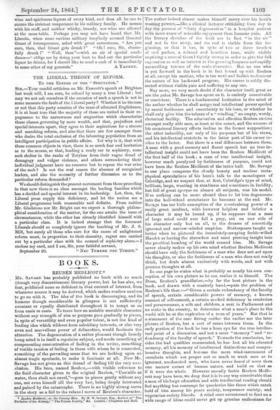THE LIBERAL THEORY OF REFORM.
To THE EDITOR OF THE ‘` SPECTATOR." Sue,—Your candid criticism on Mr. Fawcett's speech at Brighton last week will, I am sure, be echoed by many a true Liberal ; but may we not ask ourselves if the occasion of such a speech is not in some measure the fault of the Liberal party? Whether it be the case or not that this party consists of the mass of educated Englishmen, it is at least true that the majority of these are united in their re- pugnance to the narrowness and stagnation which characterize those classes governing by mere wealth, and that, prejudices and special interests apart, they agree in their aspirations for a sincere and searching reform, and also that there are few amongst them who desire the total exclusion of the labouring population from an intelligent participation in public affairs. Yet why is it, that with these common objects in view, there is so much fear and hesitation as to the means, so that, lending a ready ear to sophistry, some seek shelter in the ranks of Toryism from their vague dread of demagogy and vulgar violence, and others surrendering their individual judgment have no resource but to repeat the war cries of the mob ? Is not the real reason the absence of recognized leaders, and also the necessity of further discussion as to the particular reform demanded?
We should distinguish the present movement from those preceding in that now there is no class amongst the leading families which has a decided' and special interest in its leadership. Let, then, the Liberal press supply this deficiency, and let the nation see a Liberal programme both reasonable and definite. From neither Mr. Gladstone nor Mr. Bright can we expect a thorough philoso- phical consideration of the matter, for the one awaits the issue of circumstances, while the other has already identified himself with a particular class. It is indeed strange that the foremost Liberals should so completely ignore the teaching of Mr. J. S. Mill, but surely all those who care for the cause of enlightened reform must, in proportion to their sincerity, regret one carried out by a particular class with the counsel of sophistry alone.— I enclose my card, and I am, Sir, your faithful servant,
September 20. " NEC TEMERE NEC TIMIDE."






























 Previous page
Previous page